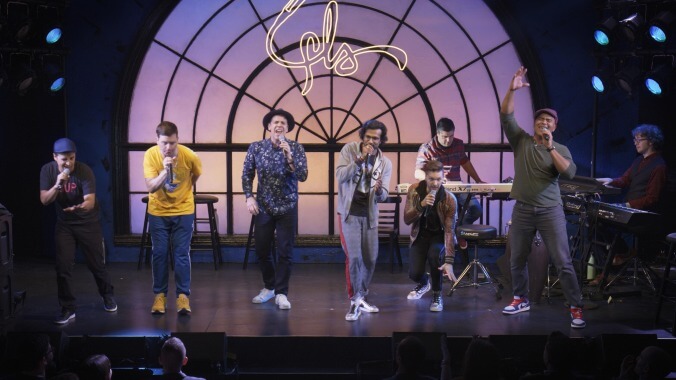Fried’s greatest instinct as a director was the foresight to turn his camera on his friends back in 2005, when they were debuting Freestyle Love Supreme at the Edinburgh Fringe Festival, and again in 2007, when Miranda and the group’s director, Thomas Kail, were prepping for the Broadway premiere of In The Heights. The doc earns an ironic chuckle when a young Kail tells Miranda, “There’s a good chance no one will ever know who you are.” But Fried doesn’t let FLS’s most famous member overwhelm the story of an ever-evolving theatrical troupe. The poignancy of We Are Freestyle Love Supreme comes from watching a group of bright-eyed young theater kids become an older, wiser but no less bright-eyed group of performers in their 40s.
Though the blockbuster success of Hamilton fractured the group for a while, it reunited in 2019 for a run of Off-Broadway and later Broadway performances celebrating its 15th anniversary. The high-profile event gives We Are Freestyle Love Supreme its focus, and occasionally leads to some self-aggrandizing as well. The film’s overly dramatic score sometimes makes the run seem like a once-in-a-lifetime reunion of a major American rock band, not the return of a relatively niche improv troupe that’s been semi-active the entire time. Still, the group’s palpable love for one another and the sheer virtuosity of what they’re able to do onstage keeps things breezily watchable. What the documentary lacks in narrative structure, it makes up for in enthusiasm.
Fried intercuts performances from 2005 and 2019 to illustrate how the members have evolved and how the group’s kindhearted spirit has stayed the same. The Mindy Project’s Utkarsh Ambudkar displays staggering verbal dexterity in his motor-mouthed freestyles, while Broadway vets Chris Jackson and James Monroe Iglehart deliver velvet-smooth vocals on improvised slow jams. FLS’s less famous members make for some of the film’s most interesting characters. Pianist Arthur Lewis looks like a bookish philosophy major and unexpectedly sings like John Legend. He’s known Miranda since the third grade, when he impressed the future Tony-winner with his ability to spell “supercalifragilisticexpialidocious.” In one sweet backstage moment, the two childhood friends discover to their delight that they both still remember the words to a rap about calculators that they wrote in sixth grade.
But the documentary’s most intriguing figure is Anthony Veneziale, Freestyle Love Supreme’s founding member and main MC. His fellow performers credit Veneziale’s empathetic leadership for defining the ethos of the group, particularly in a game called “Day In The Life,” where he invites an audience member onstage and warmly interviews them about their day. Yet as his friends moved up the ranks of Broadway, Veneziale followed a different path as a family man in San Francisco. So while Veneziale was the one who first introduced Kail to theater back in college, he eventually found his one-time mentee far surpassing him in success—a bittersweet shift that both men talk about with refreshing frankness.
We Are Freestyle Love Supreme is best when its sunny theater kid earnestness gives way to a more somber look at the realities of working in a communal yet competitive industry where creative paths often diverge. Ambudkar is similarly frank about his experience playing Aaron Burr in several early Hamilton workshops only to part ways with the show when his relationship to partying and alcohol became too personally destructive. (He’s now four years sober.) A stronger documentary would’ve made those interludes the main course, not the garnish, of the story of a multi-decade creative partnership. But with We Are Freestyle Love Supreme mostly designed as a feel-good ode to a feel-good improv show, they at least add some welcome piquancy to the comfort food.



 Keep scrolling for more great stories from A.V. Club.
Keep scrolling for more great stories from A.V. Club.